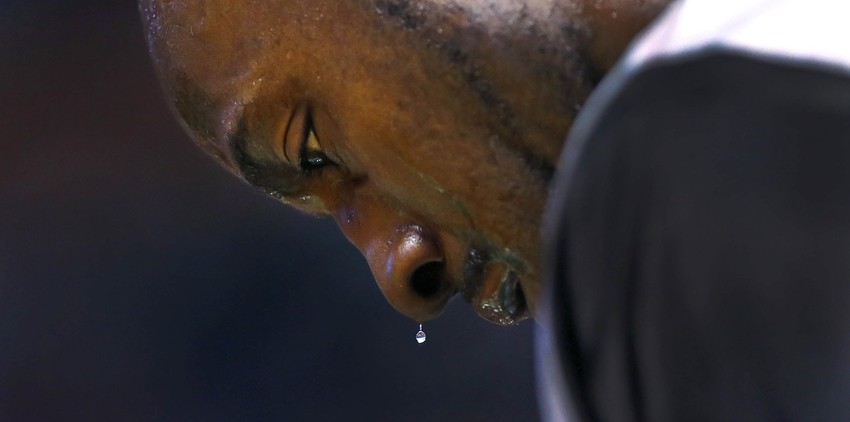‘Disciplined thought precedes disciplined action.’
And, with that, discipline is the result of hundreds and hundreds of choices you make that gradually turn who you are, at any given moment, into who you want to be.
These two thoughts were both inspired by Jim Collins (Good To Great) and Jim Rohn.
Rohn went on to say:
“Failure is not a single, cataclysmic event. You don’t fail overnight. Instead, failure is a few errors in judgment, repeated every day.”
One of the biggest mistakes that athletes make is entering a basketball practice or training session without predetermining what their intention will be for that workout. Similarly, where we often fail as coaches is in not requiring that athletes to begin with a set intention.
Having a clearly articulation and visualized goal for any practice is a discipline that is developed in thought first. From that, it translates to action.
What’s Your One Thing?
While working within the Canadian National Team development programs, we used to utilize the concept of ‘One Thing’ with the athletes.
“What’s your ‘one thing’?” I’d ask the athletes. Or, “What’s the one thing you’re focusing on that I should be watching and ready to give you feedback on?”
This simple question heightens focus and gives both the athlete and coach context for error correction, coaching interventions and, ultimately, holding kids accountable for what takes place within a training session.
Biggest Failing of ‘One Thing’
The thing you have to be on alert to when utilizing ‘One Thing,’ is that athletes will try and give you fluff for answers.
- COACH: Jon, what’s your one thing today?
- ATHLETE: Coach, I’m going to focus on hustling today in practice?
Sound typical? I’ve gotten that answer a lot.
Here’s the thing, most coaches would agree that the notion of hustling is a great thing. We all want our players to hustle. The problem is that hustle is an abstraction. Your vision of hustle as a coach might be very different from Jon’s interpretation as an athlete.
It’s important to transform abstract and vague answers into very specific, quantifiable and observable actions.
- COACH: Jon, what specifically will I see to know you’re hustling?
This question will stump your athletes — especially the first few times you go through the exercise. Most kids are allowed to get away with vague, token answers. It’s important that you stay firm about inviting specific descriptions.
The objective is twofold:
- (1) You’re establishing an agreed upon understanding of what hustle will look like;
- (2) You’re helping your athletes build a vocabulary so that they can communicate more effectively. (Often athletes don’t communicate in practice because they still have not developed the vocabulary for what to say… and then, how to say it. That’s for another blog though.)
Give Them Time To Process
Most kids will need more time to answer the question about what specifically you should be seeing to know they’re hustling. Perfect. That’s completely normal—and, necessary.
- COACH: I’ll give you some time to think about. I’ll come back to you.
[Move on to another athlete, but be sure to come back to Jon. Remember, the adage: It’s not what you say, it’s what you emphasize. If ensuring your athletes begin each basketball practice or game focused, you first have to make it a daily disciplinewhere they develop the ability to do so.]
- COACH: Jon, talk me through what specifically I’ll see to know you’re hustling?
- ATHLETE: Coach, I’m going to sprint every time you call us in and in between drills.
- COACH: Okay. I’ll keep and eye out for that. You know hustle can also come if the form of touching every line, every time, on our sprints. That type of precision to your hustle really raises the bar for the rest of the team. Is that something you’d be willing to commit to doing as well today?
- ATHLETE: Sure. I can do that, Coach.
- COACH: Are you willing to be held accountable to this standard?
- ATHLETE: Ya… I am.
- COACH: Great. Let’s have a good practice.
Are You Willing To Be Held Accountable?
This, to me, is the most powerful of questions. Did you catch it? It’s a very persuasive psychological trigger.
First, the coach established a shared understanding of what hustle will look like in that day’s practice. He’s guided the athlete to create the definition. And, when there was a gap between the athlete’s definition and his, he made a suggestion to bridge the gap. By going through this process, the athlete has been enlisted to create the standard.
A big part of accountability is ownership. It’s one thing to be held accountable to another person’s vision. More effective is when you take ownership for setting standard.
“Are you willing to be held accountable to this standard?” now means that the athlete is giving you permission to hold them up to their standard; essentially, what THEY determined they would do. To the athlete’s mind, it’s no longer ‘Coach is coming down on me again!‘… It’s ‘Coach is really holding me to the standard I set for myself. Wow!‘
Go on… experiment and explore with ‘One Thing’. Let me know how it goes!
/sef.
"Self-discipline involves acting according to what you think instead of how you feel in the moment." —P. Clemens https://t.co/OS6LQHtDJR
— theLLaBB (@theLLaBB) December 1, 2015
